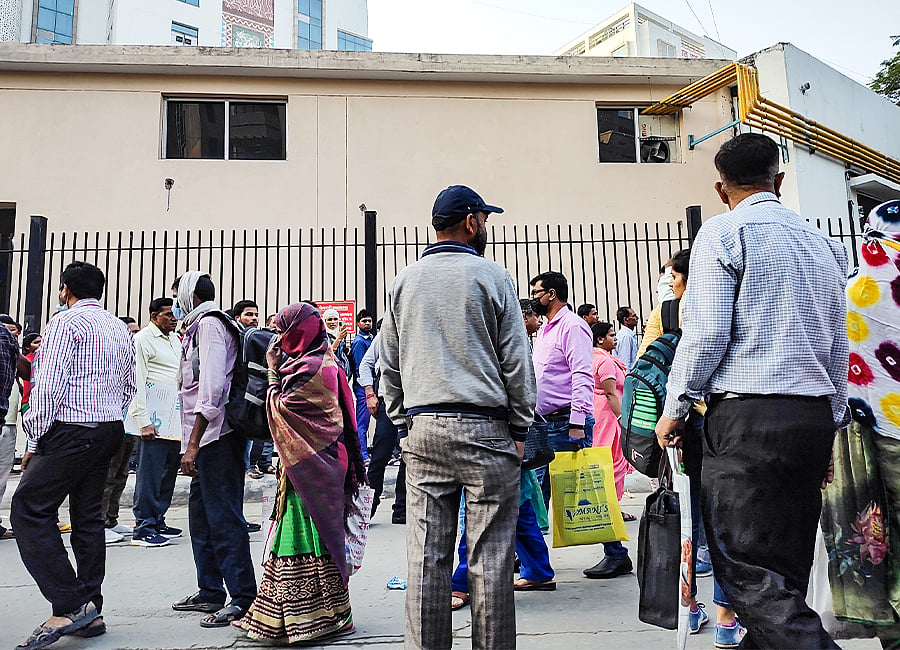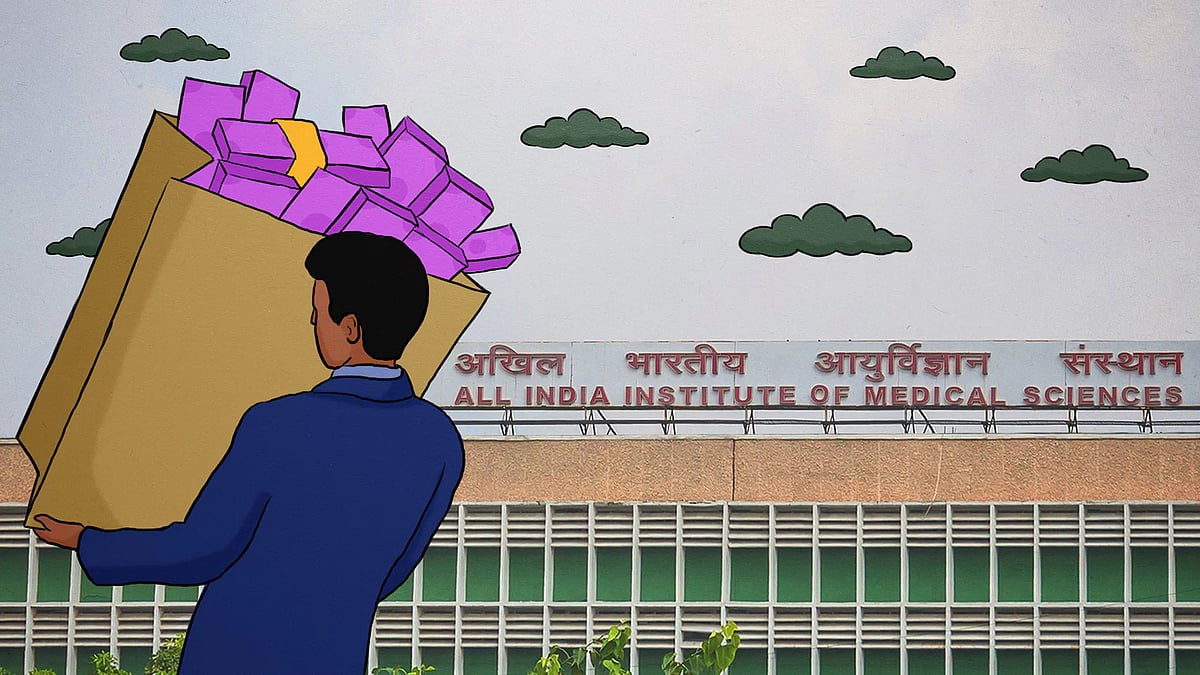Queue for queues, packed online slots, and the endless wait to be treated at AIIMS Delhi
It’s just one of the few premier public health facilities in India after all.
Lying on a sheet outside gate no. 6B at Delhi’s AIIMS, Sandhya Patel is just among the hundreds of patients who camp overnight outside the health facility each day.
It’s because the “unofficial” slots for a medical appointment are decided at night outside the gate, with patients jostling with security guards to get themselves registered on a first come, first serve basis. These slots are prioritised before the others in queues when the entry gate opens at 7 am. Moving at a snail’s pace, these rows eventually branch out towards the counters near the canteen, and the appointments are officially confirmed here.
A resident of Unnao in Uttar Pradesh, Sandhya is a small-time tailor who makes barely Rs 200 per day, and spends around Rs 3,000 on each round trip to Delhi. A single mother to two daughters, she has been doing this for the last seven years, just to get advanced gynaecological care at India’s premier health facility.
But waiting does not ensure an appointment. “If you are late, you will not get an appointment at the counters. So many people, who came for the first time, could not get appointments despite being in queue,” claimed Sandhya.
Located on the eighth floor, the OPD gets around 10,000 patients each day – an internal report for the year 2021-2022 pointed to an annual footfall of 25 lakh patients. A large number of patients from India’s poor and lower middle class find relief in public healthcare as they can’t afford expensive private treatment. But there are just few government institutes such as AIIMS that can offer tertiary or super-speciality treatment to those who can’t be helped by India’s network of primary health centres, community health centres and sub-district hospitals. The ministry of health and family welfare’s website lists 28 such facilities, including the AIIMS at Delhi.
Despite being such an important public health institute, there has been a shortage of doctors at AIIMS – 363 posts for doctors and other faculty are vacant against 1,207 sanctioned posts. Similarly, there are 1,055 vacant posts for paramedical staff as against the sanctioned number of 8,225.
And the burden is visible.
Behind the long queues at Delhi’s AIIMS are also the short window available for emergency or tatkal OPD appointments – available from 8 am to 11 am each day.
“I could not get any appointments for the last two days. This is why I have come here in the evening and got slot 1,” said a student, who was in the queue for her mother’s treatment, referring to the discreet mechanism created by security officials ostensibly to ensure parity within the queues.
There are two queues outside the OPD – one for new patients who first need to get cards and another for follow-ups who require a fresh entry on their cards.
But it’s not so easy for first-timers. Consider the example of 60-year-old Gita Devi from Bihar’s Darbhanga, who had already spent two days wandering around on the premises to understand how to get an appointment, when Newslaundry met her in one of the queues outside the OPD in March.
“On the first day, I came around 6.30 in the morning and joined the queue. But by the time I reached the counter near the canteen, I was informed that all appointments had been booked,” she said. Devi returned to her son’s house in Delhi’s Swaroop Nagar, resolving to reach the institute again, this time at 5.30 am.
“Until noon, I was wandering inside the OPD. But nothing was clear, like where to go, what to do. Nothing. Someone then suggested that I get my name listed for the queue and sit here. So, I have been here since afternoon.”
While minimal charges and quality healthcare drives patients to AIIMS, it bleeds their pockets in terms of expenses like travelling, tests and lodging. The charges for medical tests are either minimal or free, but several patients alleged that slots were unavailable.
Consider the example of Sandhya, who was compelled to get an ultrasound at a private clinic for her impending surgery as the slot at AIIMS was only available in June.
Virtual delays, offline chaos
Despite the presence of three wings – A, B and C – within the OPD, there was a sense of chaos and hopelessness for many patients trying to get a new card or appointment.
Those without appointments were directed to Wing A, while those with appointments were directed to Wing B.
Attempts to try to understand the appointment process did not evoke a clear response from officials present on the spot. And to questions at the enquiry counter, the response was a suggestion – to queue up in the morning.
When Newslaundry spoke to the help desk at OPD for an appointment, online registration was pitched as a foolproof method to avoid the night-long queues.
AIIMS has introduced online appointments to simplify the process, with one time passwords sent to phone numbers linked to Aadhaar – a method adopted by 564 hospitals across the country.
But many patients and their families from rural areas of Uttar Pradesh, Haryana, and Odisha said they could not take this route as they either did not have their numbers linked to an Aadhaar or had not ensured to carry such phones because they were unaware of this process. Asked about calling home to retrieve these OTPs, many patients claimed their families did not know how to read such texts on phones. Even those carrying such phones had to seek the staff’s help to access the OTP.



Then there were those who alleged long waiting periods for even online appointments – sometimes even one year.
“In the case of departments like medicine, online slots aren’t available for probably a year or so. If it’s the ortho department, it will take nearly four months. If patients require immediate medical attention, physical appointments are the only option available,” alleged Rishab Singh, a 19-year-old resident of Delhi’s Laxmi Nagar, unable to secure an appointment for his sister in the gynaecology department.
Singh had visited the institute with his sister for a consultation at the gastrology department, but they were referred to a gynaecologist, prompting the need for a new appointment. He was unable to get one despite arriving at 4 am and waiting until 8 am.
The online appointments – both new and follow-ups – are facilitated through the online registration system portal, which specifies 21 departments, from general medicine to rheumatology. The portal, operated by the National Informatics Centre, offers registration for physical appointments as well as teleconsultation, and also has data on appointment status, appointment slip and the option to cancel.
Newslaundry also tried to book an appointment through this portal. But the attempt to secure a new appointment in general medicine, orthopaedics and gynaecology could not succeed as all slots were booked for the current year.
Technical and server issues are also contributing to the delay.
Last year in November, a ransomware attack was reported at the Delhi AIIMS. Despite the restoration of the server in December, the Indian Express reported this year that the medical system was still tackling a slow response and was unable to retrieve certain reports such as MRI, CT scan, and biopsy results. The situation had not improved even after two months when Newslaundry visited the hospital, with patients reporting the same issues.
All this has ostensibly forced hundreds of patients to resort to offline overnight queues.
To make things worse, there is a lack of basic facilities for patients or their attendees who camp around the institute overnight. When it rains, the queue is shifted to the parking area.
“Everyone at AIIMS knows there is a queue for the OPD every night. But there is no toilet nearby. Everyone goes to the other side of the road to relieve themselves,” a patient complained.
Newslaundry tried to reach out to the AIIMS spokesperson for an interview seeking their comments. This report will be updated if a response is received.
 The thriving career of an AIIMS official accused of serial corruption
The thriving career of an AIIMS official accused of serial corruption